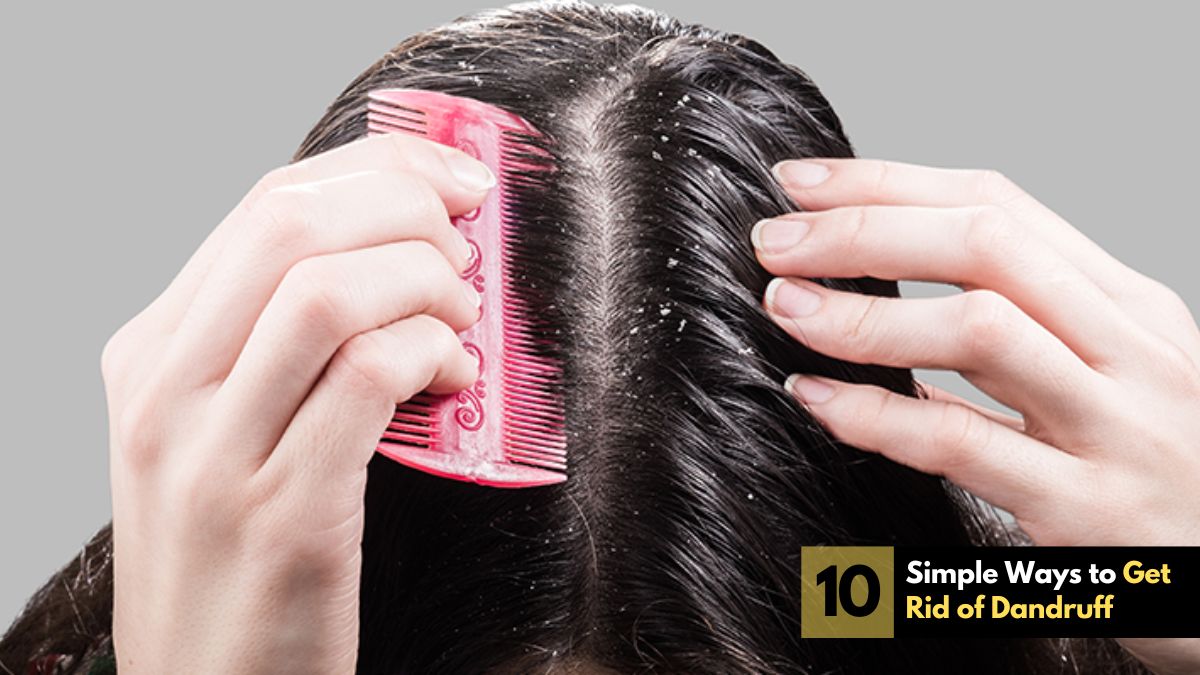How to get rid of dandruff? Do you love the color black but fear wearing anything in the color? If yes, then you probably suffer with dandruff. Dandruff is essentially dry skin but since it is the skin from your head, the slightest itch can cause the dead skin to avalanche down to your shoulders and for everyone to see.
The worst situation you can find yourself in is when you are at a party or even on a date and the person you are talking to cannot take their eyes off your shoulders. You know exactly what they are looking at but you cannot do a thing about it.
Many shampoos claim to be anti-dandruff but don’t really live up to the name. So if you really want a clean, dandruff free scalp, try these easy to find ingredients and you will be amazed at how effective they are.
How to get rid of dandruff? – Top 10 Natural Solution.
10. Indian Lilac Brew

Indian Lilac or better known as Neem is one of the best remedies for a long list of ailments. Whether it is a tooth ache or indigestion, neem can work wonders. So, it is no surprise that this plant works for dandruff as well.
All you need to do is, pluck a handful of neem leaves and bring them to a boil in about 4 cups of water. Let the leaves boil for about 15 minutes and then leave out to cool. Strain the leaves out and use the water to rinse your hair thoroughly. If you wish to see good results, use this method three to four times a week.
See also: How to Get Rid of Unwanted Facial Hair?
9. Coconut Oil Mix

The coconut is often referred to as the king of fruits and it lives up to its name. The fruit is used for a number of reasons and one of the biggest reasons is for its oil. Coconut oil is used for cooking, moisturizing, cleaning and for many other things.
The oil is applied to hair to help retain moisture which is extremely effective as coconut oil is rich is antifungal properties. A good way to fight dandruff is to use some coconut oil and mix half the amount of lemon juice with it.
Apply this mixture to the scalp and let it act for about 20 minutes. Then rinse well. Use shampoo if required. Practice this two to three times a week and your dandruff will be a thing of the past.
See also: 10 Natural Ways To Beautify Your Face
8. Apple Cider Vinegar

This is an ingredient that can be found in almost all modern kitchens and can be purchased from any super market. Apple cider vinegar is a remarkable cooking ingredient but it has been used for its pH restoring properties.
This is exactly what it does to the scalp and stops any form of yeast growing on the head. It helps to clear any blocked pores and releases the dirt which allows the skin to breathe which in turn decreases the rate of the skin cells dying.
To use apple cider vinegar to fight dandruff, use two tablespoons of it and mix it with equal amounts of water and fifteen drops of tea tree oil. Apply this to your scalp and let it work for ten minutes. Wash thoroughly and continue to use this mix at least two to three times a week for best results.
See also: Top 10 Healthy Hair SuperFoods
7. Baking Soda

When we think of baking soda, we would usually associate it with cakes and bread. How about baking soda for hair care? Impossible? Think again. It is a brilliant exfoliator and it absorbs all the unwanted oils found on the scalp.
It helps clean out the dead skin and restores the pH levels which stop any harmful fungal growth. All you need to do is run a handful of baking soda through slightly wet hair and massage the scalp a bit.
Rinse it out with warm water after about 5 minutes but do not use shampoo. Repeat this once or twice a week and you will see immediate results.
See also: 10 Health Benefits of Fasting
6. White Vinegar

As we all know, vinegar has a certain amount of acetic acid which makes it sour. White vinegar is the same and when used for the scalp, it prevents any fungi from growing on the head. You can use half a cup of vinegar and mix it in two cups of water and rinse your hair with it after shampooing.
Rinse out the vinegar mix after 5 minutes with clean water. Another way to use white vinegar for dandruff problems is to mix two parts of vinegar with one part olive oil and three parts of water. Apply to the scalp and leave for ten minutes.
Rinse and use mild shampoo to wash it out. Do this twice a week and your scalp will be itch free.
5. Olive Oil

We know that oil is used to change something from dry to moist. In that same way, when the scalp dries out, olive oil is one of the most effective ways to moisten it again. Best way to use this wonder ingredient is to heat some extra virgin olive oil and apply to the scalp and gently massage the head.
Then wrap a warm soft towel around the head and leave it for a minimum of 45 minutes. If you can leave it overnight, it will be better. Shampoo and condition your hair and follow this method at least three times a week to ensure that the oil works its magic.
See also: The 10 uses of Olive Oil
4. Tea Tree Oil

This is another brilliant essential oil which has outstanding remedial qualities. Tea tree oil is really something that has slowly sneaked its way into every home and the users have no complaints at all. Its anti-fungal properties make a perfect applicant to a dandruff riddled scalp.
Just adding a few drops of tea tree oil to some shampoo (approximately one drop oil to one ounce of shampoo) and use the mixture. Another good way to use this oil is to dilute it with a few drops of coconut or olive oil.
Apply the oil mix and leave for 30 minutes minimum or overnight and then wash thoroughly. Once or twice a week would be more than enough for a healthy scalp.
3. Lemon Juice

As described earlier, acids are good for the scalp and fighting fungal growth. It helps with an itchy head and cleans out dead skin. To prevent dandruff with the use of lemon juice, just add the juice of half a lemon to quarter cup of yogurt.
Mix it well and then apply it to the scalp and hair and leave it on for twenty minutes. Rinse and shampoo well. Another way is to add a few teaspoons of lemon juice to water and rinse the head with the mix.
Leave it on for five minutes and then rinse and shampoo. Use lemon juice no more than four times a week to be free from dandruff.
2. Aspirin

Yes, you are reading it right. Aspirin, a common headache medication, is also a wonderful way to get rid of dandruff. The reason behind this is the salicylic acid property found in the aspirin. It helps in exfoliating the scalp and cleaning out the dead skin. Just take two aspirin tablets and crush them to a powder.
Mix it with a blob of shampoo and apply to the scalp. Massage well and leave for a few minutes. Wash well with shampoo until all the powder is removed. Or you can mix three aspirins with one tablespoon of vinegar.
Massage this mixture into your scalp and let it work for half an hour. Wash thoroughly to remove any aspirin powder.
1. Fenugreek Seeds

These commonly found seeds are extremely good for digestion but they have anti-fungal properties that work wonders for the dry scalp. Just soak a couple of tablespoons of these seeds in some water and leave it overnight. Then next morning grind the seeds into a paste and mix it well with a cup of yogurt.
Apply this to the hair and scalp and leave it on for a couple of hours. Shampoo and wash properly and repeat this method twice a week for effective results.
Summary: How to get rid of dandruff fast?
To get rid of dandruff, you can follow these steps:
- Maintain proper hygiene: Wash your hair regularly with a gentle shampoo to keep your scalp clean. Regular cleansing helps remove excess oil, dead skin cells, and product buildup that can contribute to dandruff.
- Use an anti-dandruff shampoo: Look for shampoos specifically formulated to treat dandruff. These shampoos usually contain active ingredients such as zinc pyrithione, ketoconazole, selenium sulfide, or coal tar, which can help reduce dandruff and control its recurrence. Follow the instructions on the shampoo bottle for best results.
- Massage your scalp: While shampooing, gently massage your scalp with your fingertips to help loosen and remove flakes. This can also stimulate blood circulation in the scalp and promote a healthier scalp environment.
- Avoid excessive use of hair products: Certain hair styling products like gels, hairsprays, and mousses can contribute to dandruff by causing buildup on the scalp. Try to limit the use of such products, especially if you notice they worsen your dandruff.
- Manage stress levels: High stress levels can exacerbate dandruff, so it’s important to find healthy ways to manage stress. Engaging in activities like exercise, meditation, or pursuing hobbies can help reduce stress and promote a healthier scalp.
- Maintain a balanced diet: A diet rich in nutrients, particularly zinc, B vitamins, and omega-3 fatty acids, can promote a healthy scalp and reduce the likelihood of dandruff. Include foods like fish, nuts, seeds, whole grains, fruits, and vegetables in your diet.
If your dandruff persists despite these measures or if it becomes severe, it’s advisable to consult a dermatologist for further evaluation and treatment options.
See also: 10 Craziest Ways to Lose Weight
Best shampoo for dandruff
As for the best shampoo for dandruff, different products work for different individuals. Some popular anti-dandruff shampoos include Nizoral, Head & Shoulders, Selsun Blue, and Neutrogena T/Gel. However, it’s important to remember that everyone’s scalp is unique, so what works for one person may not work for another. It may require some trial and error to find the best shampoo that effectively addresses your specific dandruff concerns.
Dandruff treatment
Dandruff treatment usually involves a combination of different approaches to address the underlying causes and reduce the symptoms. Here are some common treatments for dandruff:
- Medicated Shampoos: Using over-the-counter medicated shampoos specifically designed to treat dandruff can be effective. Look for shampoos containing active ingredients like zinc pyrithione, ketoconazole, selenium sulfide, or coal tar. Follow the instructions on the shampoo bottle and use it regularly as directed.
- Prescription-strength Shampoos: If over-the-counter shampoos do not provide sufficient relief, your dermatologist may prescribe stronger medicated shampoos or topical treatments containing ingredients like ketoconazole, ciclopirox, or corticosteroids.
- Topical Steroids: In some cases, your dermatologist may prescribe topical corticosteroids to reduce inflammation and itching associated with dandruff. These are usually available as creams, lotions, or foams.
- Anti-fungal Creams: If dandruff is caused by a fungal infection, such as seborrheic dermatitis, your dermatologist may recommend using anti-fungal creams or ointments to reduce inflammation and control the fungal growth.
- Prescription Oral Medications: In severe cases or when other treatments fail, your dermatologist may prescribe oral medications like antifungal drugs, retinoids, or immunosuppressants to manage dandruff.
- Light Therapy: In certain cases, light therapy, such as ultraviolet (UV) light treatment, may be recommended to address the underlying causes of dandruff.
It’s important to consult a dermatologist if your dandruff persists, becomes severe, or causes significant discomfort. They can provide a proper diagnosis and recommend the most suitable treatment options based on your specific condition.
What causes bad dandruff?
Bad dandruff, also known as severe dandruff or chronic dandruff, can be caused by various factors. Here are some common causes:
- Malassezia fungus: The presence of a yeast-like fungus called Malassezia on the scalp is a common cause of dandruff. This fungus feeds on the scalp’s natural oils, leading to increased cell turnover and the formation of flakes.
- Seborrheic dermatitis: This is a common skin condition characterized by red, inflamed, and oily skin. It can affect the scalp, leading to excessive flaking and dandruff. Seborrheic dermatitis is thought to be caused by a combination of factors, including the Malassezia fungus, sebum production, and individual susceptibility.
- Dry scalp: Dryness of the scalp can cause flaking and dandruff. It may be triggered by cold weather, low humidity, frequent washing with harsh shampoos, or overuse of hair products that strip moisture from the scalp.
- Sensitivity or allergic reactions: Some people may have sensitivities or allergies to certain hair care products or ingredients, such as sulfates, fragrances, or preservatives. These reactions can lead to scalp irritation, inflammation, and dandruff.
- Poor hygiene: Infrequent or improper hair washing can contribute to the buildup of oil, dead skin cells, and product residue on the scalp, creating an environment conducive to dandruff formation.
- Stress and hormonal changes: Stress and hormonal fluctuations can disrupt the balance of the scalp, leading to increased oil production and dandruff.
- Certain medical conditions: Certain underlying medical conditions like psoriasis, eczema, or fungal infections can contribute to severe dandruff symptoms.
It’s important to note that the causes of dandruff can vary from person to person, and individuals may have a combination of factors contributing to their dandruff condition. Consulting with a dermatologist can help determine the underlying cause and provide appropriate treatment options.






